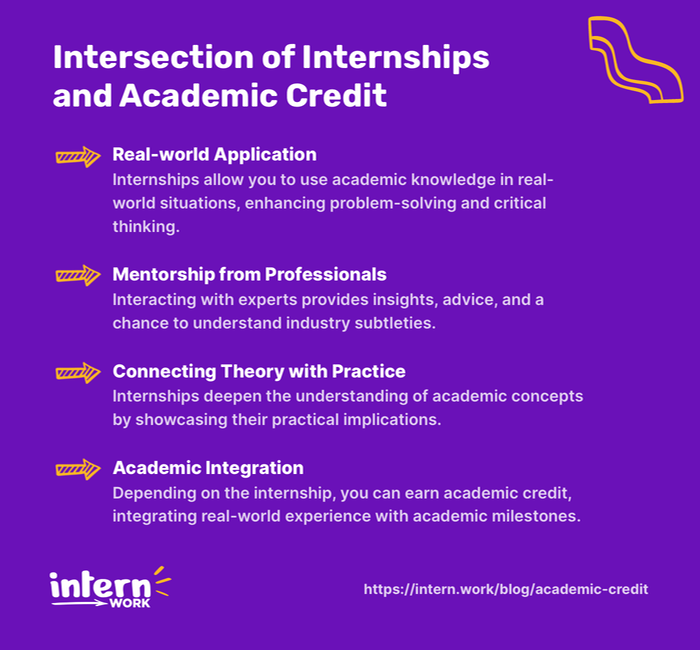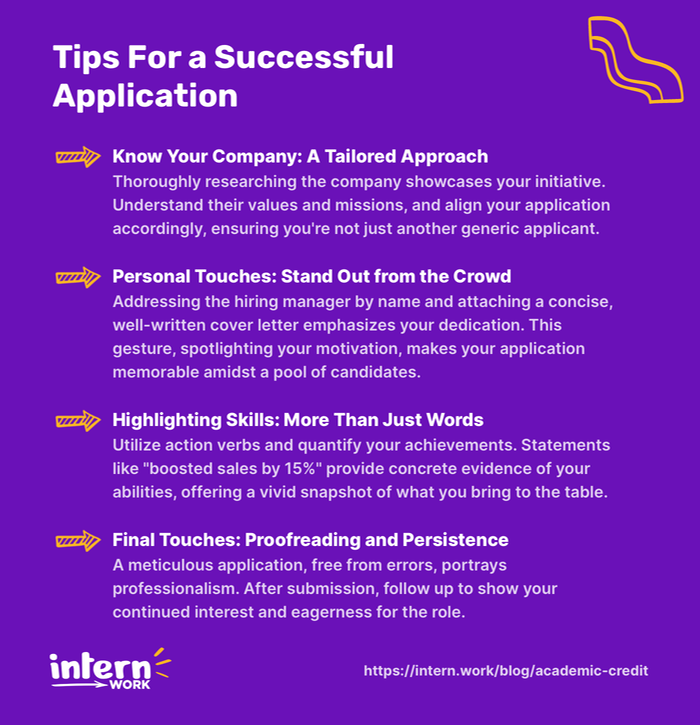
Internships and academic credit can sometimes seem like a complicated maze to navigate. When you think you’ve figured it out, another requirement pops up. But fear not! We’re here to help you demystify the process and make it smooth sailing. So, grab a cup of coffee, dive in, and discover how to ace the internship and academic credit adventure!
Understanding the Concept of Internship and Academic Credit
Before we plunge into the depths of internship and academic credit requirements, let’s take a moment to understand what they actually mean.
Internships have become an integral part of the educational experience for students pursuing various fields of study. They offer a unique opportunity to bridge the gap between theory and practice by allowing students to apply classroom knowledge in real life. It’s like stepping into the professional world with your goggles on, ready to absorb all the practical knowledge you can get.
When you embark on an internship, you become part of a professional environment where you can observe and learn from experienced professionals in your chosen field. This hands-on experience enables you to understand the industry more deeply, develop new skills, and build a network of valuable contacts.
Definition of Internship
An internship is not just a temporary stint or a way to fill your summer break. It is a valuable learning opportunity beyond fetching coffee or making photocopies. It is a chance to actively contribute to projects, solve real-world problems, and make a meaningful impact. Whether it’s working in a research laboratory, assisting with marketing campaigns, or coding software applications, internships provide a platform for you to immerse yourself in the day-to-day operations of a company or organization.
During an internship, you may have the opportunity to work closely with professionals who can mentor and guide you in your chosen field. Their expertise and guidance can help you develop essential skills, gain industry-specific knowledge, and understand the intricacies of the work environment.
The Importance of Academic Credit
Academic credit is like the golden ticket to recognition for your hard work during the internship. It proves that you’ve gained valuable skills and knowledge, which can boost your future career prospects.
When you receive academic credit for an internship, your educational institution acknowledges the educational value of the experience you gained. It demonstrates that you have successfully integrated your academic learning with practical application and have met the requirements set by your institution for earning credit.
Academic credit adds credibility to your resume and allows you to showcase your professional growth and development. It can be a valuable asset when applying for future internships, jobs, or graduate programs, as it demonstrates your commitment to continuous learning and your ability to apply theoretical concepts in a real-world context.
Furthermore, academic credit may also have specific requirements, such as completing reflective journals, submitting project reports, or undergoing supervisor evaluations. These additional components provide a structured framework to critically reflect on your internship experience, identify your strengths and areas for improvement, and enhance your overall learning.
Internships offer a unique opportunity for students to gain practical experience and apply their classroom knowledge in a real-world setting. Academic credit serves as recognition for the educational value of these experiences and can significantly enhance your future career prospects. So, embrace the world of internships and seize the opportunity to grow personally and professionally!
Internships provide practical experience and skill application in real-world settings. Academic credit recognizes their educational value, boosting future career prospects. It adds credibility, showcases growth, and demonstrates a commitment to learning.
The Intersection of Internships and Academic Credit
Now that we understand the essential concepts let’s explore how internships and academic credit work together.
Internships and academic credit go hand in hand. They form a beautiful symbiotic relationship where your internship experience directly contributes to your academic progress. Think of it as a win-win situation!
-
Applying Knowledge to Real-World
When you participate in an internship, you can apply the knowledge and skills you have gained in your academic studies to real-world situations. This practical application solidifies your understanding of the subject matter and enhances your problem-solving abilities and critical thinking skills.
-
Practical Experiences: Enriching learning
Imagine you are studying marketing, and you land an internship at a renowned advertising agency. During your internship, you work on real marketing campaigns, collaborate with professionals in the industry, and gain firsthand experience in developing strategies, conducting market research, and analyzing consumer behavior. These practical experiences enrich your learning and provide valuable insights into the industry’s best practices and current trends.
-
Mentorship and Guidance: Learn from Experts
Furthermore, internships offer a unique opportunity for mentorship and guidance from experienced professionals. You can access their wealth of knowledge and expertise as you work alongside seasoned experts in your field. They can provide valuable advice, offer insights into industry nuances, and help you navigate the challenges and opportunities that arise during your internship.
-
Bridging Theory and Practice: Academic Progression
Internships also play a crucial role in your academic progression. They provide practical skills that complement your theoretical knowledge, opening doors to new opportunities and helping you grow personally and professionally. By participating in internships, you gain a deeper understanding of the practical applications of your academic studies and how they relate to the real world.
-
Exposure and Adaptability: Diverse Work Environments
Additionally, internships often expose you to different work environments, cultures, and perspectives. This exposure broadens your horizons, enhances your adaptability, and fosters your ability to work effectively in diverse teams. Employers highly value these skills and can give you a competitive edge in the job market.
-
Academic Credit and Recognition: Integration of Experience
It is worth noting that internships can vary in credit requirements. Some internships may offer academic credit as part of their program. In contrast, others may require you to coordinate with your educational institution to receive credit. In either case, integrating internships and academic credit ensures that your practical experience is recognized and contributes to your overall academic progress.

Internships and academic credit complement each other, bridging theory and practice. They provide practical experiences, mentorship, exposure to diverse work environments, and recognition for your academic progress. Embrace internships for growth and integration of real-world experience.
Navigating Requirements for Academic Credit
Now, let’s navigate the nitty-gritty details of internship requirements for academic credit.
Identifying Suitable Internships for Credit
Finding the perfect internship can be daunting, especially when aiming for academic credit. But fear not! Countless resources are available to help you find internships that align with your educational goals and requirements.
One valuable resource is your university’s career services office. They often have a database of internships approved explicitly for academic credit. The university has vetted these internships to ensure they meet the criteria for recognition. Additionally, career services advisors can provide guidance and support throughout the internship search process, helping you identify internships that will enhance your academic experience.
It’s also worth exploring professional organizations and industry-specific websites. Many of these organizations have internship programs recognized by universities for academic credit. These internships often provide valuable hands-on experience in your chosen field. They can help you build a strong network of professional contacts.
Understanding University Policies on Internships
Each university has its own set of policies and guidelines regarding internships and academic credit. Familiarize yourself with these policies to ensure you’re on the right track and meet all requirements.
Start by reviewing your university’s website or student handbook. Look for information on internship eligibility, credit hour requirements, and any specific forms or documentation you must complete. Understanding the timeline for applying for credit and any deadlines you need to meet is essential.
Additionally, reach out to your department’s academic advisor or internship coordinator. They can provide detailed information about your program’s specific requirements and answer any questions you may have. They can also guide you through obtaining the necessary signatures and approvals.
Some universities may require you to complete specific assignments or reflective essays alongside your internship to earn academic credit. These assignments are designed to help you connect your internship experience and academic coursework. Understanding these requirements in advance will allow you to plan your internship accordingly and make the most of your academic credit.
To navigate internship requirements for academic credit, use resources like your university’s career services office and online platforms. Understand your university’s policies, credit hour requirements, and any additional assignments. Seek guidance from your academic advisor for compliance and maximize your academic credit.
The Application Process for Internship Credit
Now that you’ve found the internship of your dreams let’s dive into the application process for internship credit.
Internships are a valuable opportunity for students to gain practical experience in their field of study. They provide a chance to apply theoretical knowledge to real-world situations, allowing students to build a network of professional contacts and enhance their resumes. However, before you embark on this exciting journey, you must go through the application process.
Preparing Your Application
First and foremost, be sure to tailor your application materials to highlight your qualifications, skills, and passion for the internship. Show them why you’re the perfect fit!
When preparing your application, take the time to research the company thoroughly. This will enable you to understand their mission, values, and goals, allowing you to tailor your application to their needs. You show genuine interest and dedication by demonstrating your knowledge of the company.
Furthermore, it is crucial to showcase your relevant experiences and skills. Highlight any previous internships, part-time jobs, or volunteer work that aligns with the internship you are applying for. Emphasize the tasks you performed, the skills you acquired, and the impact you made. This will demonstrate your ability to contribute effectively to the organization.
In addition to highlighting your experiences, it is essential to articulate how the internship aligns with your academic and career goals. Explain how the internship will allow you to further develop your skills, gain industry-specific knowledge, and explore your interests. Demonstrating the connection between the internship and your aspirations shows that you have carefully considered the opportunity.
Lastly, before submitting your application, meticulously proofread it to avoid typos or errors. A polished application demonstrates your attention to detail and professionalism. Take the time to review your documents multiple times, and consider asking a trusted friend or mentor to review them as well. Fresh eyes can often catch mistakes that you might have missed.
Tips for a Successful Application
Here are a few insider tips to help you craft a standout application:
- Research the company thoroughly to tailor your application to their needs.
- Showcase your relevant experiences and skills.
- Highlight how the internship aligns with your academic and career goals.
- Meticulously proofread your application to avoid any typos or errors.
- Personalize your application by addressing the hiring manager by name.
- Include a well-written, concise cover letter highlighting your motivation and enthusiasm.
- Use action verbs to describe your experiences and accomplishments.
- Quantify your achievements whenever possible to prove your abilities.
- Follow the application instructions carefully and submit all required documents.
- Be proactive and follow up on your application after a reasonable amount of time has passed.

Tailor your application to highlight your qualifications and passion for the internship. Research the company and showcase relevant experiences. Explain how the internship aligns with your goals. Proofread meticulously for accuracy.
Maximizing Your Internship Experience
Your journey continues after securing the internship and academic credit. Now it’s time to make the most out of this valuable experience!
Internships are not just about getting a foot in the door of your desired industry but also opportunities for personal and professional growth. It’s essential to approach your internship with a mindset of continuous learning and development.
Take every opportunity to learn, grow, and contribute during your internship. Treat it as a chance to absorb knowledge like a sponge and build strong professional connections. Attend meetings, workshops, and training sessions to expand your skill set and gain valuable insights from industry experts. Engage in conversations with your colleagues and supervisors to understand their experiences and learn from their expertise.
Additionally, feel free to take on new challenges and responsibilities. Step out of your comfort zone and volunteer for projects that align with your interests and goals. This will showcase your enthusiasm and initiative and provide you with valuable hands-on experience that can be translated into future career opportunities.
Making the Most of Your Internship
While it’s important to focus on your day-to-day tasks and responsibilities, looking at the bigger picture and understanding how your internship fits into your long-term career goals is equally crucial.
One way to maximize your internship experience is to set clear goals and objectives. Reflect on what you hope to achieve as an intern and discuss these goals with your supervisor. This will help you stay focused and provide you with a sense of direction and purpose throughout your internship.
Furthermore, take advantage of networking opportunities. Attend company events, industry conferences, and professional meetups to expand your network and connect with professionals in your field. Building relationships with individuals who share your interests and aspirations can open doors to future job opportunities and mentorship.
Maximize your internship experience by continuously learning, taking on challenges, setting goals, and networking with professionals in your field.
Key Takeaways
- Internships provide an opportunity to bridge the gap between theory and practice by applying classroom knowledge in a real-life setting. They offer hands-on experience, skill development, and a chance to build a professional network.
- Academic credit serves as recognition for the educational value of internships and can enhance future career prospects. It demonstrates the integration of academic learning with practical application and shows commitment to continuous learning.
- Internships and academic credit contribute to academic progress. Practical application of knowledge enhances understanding, problem-solving abilities, and critical thinking skills. Internships also provide mentorship and exposure to different work environments and perspectives.
- Finding suitable internships for academic credit can be done through university career services, online internship platforms, and industry-specific websites. These resources provide approved internships and information on eligibility for academic credit.
- Understanding university internship policies is important to meet requirements and deadlines. Review your university's website or student handbook and consult with academic advisors or internship coordinators for specific guidelines.
- The application process for internship credit involves tailoring your application materials, showcasing relevant experiences and skills, and articulating how the internship aligns with your academic and career goals. Proofread your application carefully before submission.
- Make the most of your internship by approaching it with a mindset of continuous learning and growth. Engage in learning opportunities, take on new challenges, and build professional connections. Set clear goals and objectives for your internship and leverage networking opportunities for future career prospects.
Wrapping up
The skills and knowledge you acquire during your internship can give you a unique edge in your academic endeavors. Consider creative ways to incorporate your internship experience into your coursework, projects, or presentations.
Consider discussing your internship experience in class discussions or using it as a real-life case study for assignments. This will enhance your understanding of theoretical concepts and demonstrate your ability to apply classroom knowledge to practical, real-world situations.
Furthermore, leverage your internship experience when writing papers or conducting research. Use the insights and experiences gained during your internship to provide a fresh perspective and support your arguments. This will make your academic work more relevant and engaging and showcase your ability to connect theory with practice.
Remember, your internship is not just a checkbox on your resume. It’s an opportunity to gain valuable skills, knowledge, and connections that can shape your future career. By approaching your internship with a proactive and open mindset, you can make the most of this experience and set yourself up for long-term success.






